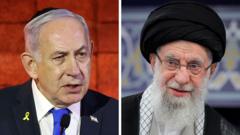As conflicts escalate, analysts question the implications of Israel's recent military strategies against Iran's elite.
**Israel's Bold Offensive Against Iran: A Strategic Move or Miscalculation?**

**Israel's Bold Offensive Against Iran: A Strategic Move or Miscalculation?**
Israeli military strikes on Iran's leadership signal a new phase in regional tensions.
Israel's recent military campaign against Iran has been marked by an unprecedented level of intensity and scope compared to previous operations. The strikes appear to draw inspiration from Israel's past military successes, particularly the offensive against Hezbollah in Lebanon last November. Just as the goal was to incapacitate Hezbollah's missile capabilities, Israel now aims to undermine Iran's military response by targeting essential military infrastructure and the nation's leadership.
Recent footage from Tehran showcases specific sites under attack, reminiscent of the strategic strikes on Hezbollah's strongholds in Lebanon that led to the significant loss of life among its leadership, including the notable killing of Hassan Nasrallah. However, this time, while the Iranian Supreme Leader Ali Khamenei remains safe, Israel has successfully targeted high-ranking officials, including military chief Hossein Salami and key nuclear scientists, marking an unparalleled assault on Iran's elite.
Israeli Prime Minister Benjamin Netanyahu has hinted that these operations may continue for an extended period, provoking speculation about Iran's potential response. Past assaults have elicited counter-attacks from Tehran, but this latest strategy seems designed to diminish Iran's capacity for retaliation. Analysts suggest that Netanyahu's decision to launch this offensive may be influenced by the precarious state of negotiations surrounding Iran's nuclear program, which were on the brink of a crucial sixth round of talks with the U.S.
Netanyahu, who has consistently warned against Iran acquiring nuclear capabilities, suggests that intelligence indicates Tehran could produce fifteen nuclear bombs imminently. This creates a pressing imperative for Israel to act preemptively, ensuring that any nuclear deal perceived as unfavorable is dismantled before it can gain traction.
Nonetheless, some military analysts caution that Israel’s assessment of weakened threats from Iran and its regional proxies may be overly optimistic. As the repercussions of these actions unfold, the potential for escalating conflict in the Middle East remains a significant concern, raising the stakes for both Israel and Iran in this high-stakes confrontation.





















